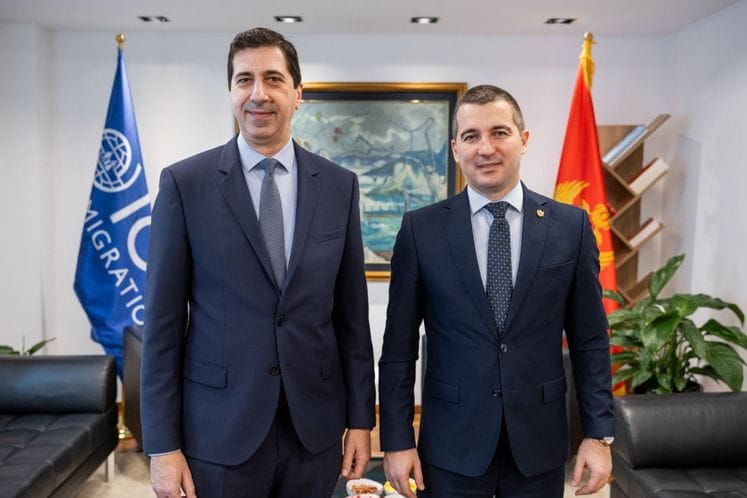- Government of Montenegro
DPM Bečić meets with IOM Chief of Mission Vladimir...
DPM Bečić meets with IOM Chief of Mission Vladimir Gjorgjiev

Deputy Prime Minister Aleksa Bečić met with Chief of Mission of the International Organization for Migration (IOM) Vladimir Gjorgjiev. The officials expressed satisfaction with the ongoing cooperation, particularly emphasising Montenegro's engagement in programmes supporting the development of institutional and legislative frameworks in the areas of asylum, migration, and visa regimes.
In the spirit of full compliance with EU legislation, Bečić highlighted planned amendments to the Law on Foreigners aimed at improving the procedure for determining the status of stateless persons. Additionally, he emphasised the Government's support for the socio-economic advancement of migrants, particularly emphasising their education, healthcare, and social protection.
Deputy Prime Minister Bečić also highlighted the Decision on temporary protection of persons from Ukraine, and the establishment of a Coordination Body involving all key sectors further underscored Montenegro's seriousness in addressing this issue.
By ensuring healthcare, access to data for enrolling children in schools and preschool institutions, as well as facilitating work permit issuance, we provide comprehensive support to individuals from Ukraine under temporary protection, Bečić emphasised.
Gjorgjiev highlighted regional cooperation in combating illegal migration and crime as a key component of greater security in the Western Balkans and beyond. He also praised the efforts of the Ministry of the Interior to establish a system for electronic identification and registration of migrants linked to EURODAC, aiming to improve information exchange with the region and the EU.
The Deputy Prime Minister reviewed political developments in the country, which undoubtedly testify to the overall social stabilization and democratic maturation of Montenegro.
Appointments in the judiciary, strengthening the judicial and prosecutorial system, and restoring the functionality of institutions are key internal drivers for Montenegro's integration path. If there is enough wisdom, dedication, and perseverance in the reform path of all factors and actors in our society, I see the year 2028 as a very realistic possibility for our joining the European Union, Bečić noted.
Commenting on current political developments in our country, Gjorgjiev highlighted a series of decisions made with broad consensus in Parliament as a sign of societal and institutional maturity, confirming social stability and cohesion. "Recent successes in unblocking the judiciary and system institutions should serve as an incentive not to miss the opportunity before you. International partners recognize and appreciate the maturity shown by the new government at the beginning of its mandate," Gjorgjiev concluded.

